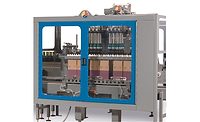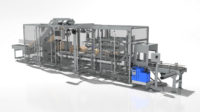Case packers and wrappers deliver flexibility, speed
Packaging machinery market approaching $10 billion

Designed for the beer industry, Krones manufactures Varioline, a robotic pickand- place packer that operates as fi ve machines in one and features a case erector, basket erector, basket inserter, bottle inserter and case sealer, and can run as fast as 850 bottles a minute. (Image courtesy of Krones Inc.)
To stay ahead of the curve and provide complete packaging solutions to the beverage industry, packaging machinery manufacturers are developing case packers and wrappers that offer the flexibility to accommodate line changeovers, handle multiple packaging types, assemble variety packs and meet the industry’s need for speed.
Demand for innovative packaging equipment is growing as operations look to keep up with SKU proliferation within the beverage industry. In fact, a report from the Association for Packaging and Processing Technologies (PMMI) highlights a total market value of $9.8 billion, a 4.8 percent increase in the U.S. packaging machinery market from 2015 to 2016.
PMMI’s annual State of the Industry report also estimates that domestic shipments of packaging machinery were worth $7.73 billion in 2016 and are forecast to grow at a compound annual growth rate of 2.2 percent, reaching $8.8 billion in 2022.
“The forecast for the packaging machinery market continues to be robust. We anticipate growth in major market segments such as pharmaceuticals, as well as food and beverage,” said Jorge Izquierdo, PMMI’s vice president of market development, in a statement. “Factors such as population growth, growing demand for automation and machinery optimization, as well as a rise in eCommerce [are] fueling this development.”
With technological innovation driving increased market value, multiple packaging machinery manufacturers have identified flexibility and quick changeovers as key trends within the beverage industry.
“Multiple SKUs and club-price-type of packaging has increased the number of changeovers and variances in the packaging formats [that] our customers request,” says Jean Dion, vice president of business development at Montréal, Canada-based Geosafe Inc. “Quick-and-easy changeovers are a must in any type of packaging goods. The use of secondary packaging [has] increased the billboard look of multipacks with high praise for variety packs [for] the introduction of new flavors.
“Small convenient pack sizes are hot,” he continues. “Flexible packaging formats and SKU changes need to be quick and painless with the ability to go back to high speed in a short time period.”
Retail-ready solutions
Rick Gessler, vice president of engineering and marketing at St. Paul, Minn.-based Delkor Systems, notes that machinery flexibility is essential for retail-ready packaging solutions, which are in demand by many retailers.
“The increased need for greater flexibility in packaging equipment is having a profound impact on the design and engineering of modern packaging equipment,” he says. “For instance, many big-box retailers today, such as Walmart and Kroger, are transitioning to retail-ready package designs that enable more efficient in-store operations, present key product information clearly to consumers to enable quick decision-making, and to maximize product variety in limited shelf space. This means easy-to-open secondary packaging, and clean and branded shelf appearance for products in display trays.”
To entice consumers’ attention to a product on-shelf, brands are seeing a growing need for multiple packaging designs. Delkor recently launched the MSP-m robotic case packer, which offers greater flexibility for packing products such as pouches and bags with one machine, the company says.
“[I]t allows producers to pack either Delkor’s retail-ready package design, the Cabrio Case, or standard shipping boxes with a simple five-minute changeover,” Gessler explains. “We also engineered the machine with tool-less changeover so machine operators can easily changeover and adapt the machine for different packaging designs.”
Retailers also are requesting smaller pack quantities at the same fill rates, which is putting additional pressure on the need for flexible and faster packaging solutions, says Mark Forsberg, technical sales director at Krones Inc., Franklin, Wis.
Although variety packs of beer and carbonated soft drinks historically were handled by contract packers, the industry is seeing a deviation from that trend, Forsberg says. “[T]he cost and packaging waste is making it justifiable to produce variety packs in-house,” he explains. “That’s why Krones provides both semi-automatic and fully automatic variety packaging lines.”
Specifically designed for the beer industry, Krones manufactures Varioline, a robotic pick-and-place packer that is the “king of flexibility,” Forsberg says. The small-footprint (20-by-20-foot) machine operates as five machines in one and features a case erector, basket erector, basket inserter, bottle inserter and case sealer, and can run as fast as 850 bottles a minute. For added versatility, the machine quickly can changeover to run cans in fiberboard, and then in tray pack. However, shrink film would require a second machine, he adds.
Krones also offers Variopac Pro — a part of the company’s continuous motion machine family — which is designed to package shrink film, tray/shrink film, plastic clips and wrap-around corrugated. “We see many more wrap-around applications than [regular slotted containers] (RSC) for a number of reasons, not only [for] the cost savings of the wrap-around but since wrap-around is a much tighter package, it often eliminates the need for partitions,” Forsberg says. “In the case where partitions are still required, we incorporate partition inserts into our wrap-around packers at speeds up to 80 cases a minute, [while] wrap-around corrugated packs can run in excess of 100 cases a minute.”
Broadening portfolio
Whether it’s to accommodate new and unique packages or to find ways to reduce the amount of corrugate or shrink material used, case packer and wrapper manufacturers are working to keep pace with evolving trends in the beverage industry.
“It used to be only 12-ounce cans,” explains Don Swanson, beverage sales manager for Alexandria, Minn.-based Douglas Machine Inc. “Today, there are many varying sizes and shapes, including slim and tall. PET is also ever-changing in sizes offered and weakening bottle structure to save money.
“The [lightweighting] of bottles makes them more difficult to run. This can spill over to packaging materials, i.e., paperboard and film structures,” he continues.
Suppliers note the impact of sustainability not only on case packing and wrapping equipment but also on the products themselves. “Consumers are looking for beverages to play vital roles in their diets and health routines. Drinkable breakfasts and lunches are becoming more prominent as consumers look for meal replacements,” says Mike Brewster, director of sales and marketing for Schneider Packaging Equipment, Brewerton, N.Y.
“Many consumers want their products in packaging that is recyclable and constructed with renewable materials,” he adds. “The net result is a shift in the type of packaging being used. … End-users are looking for convenience married with features such as ease of access, handling and disposal — all while ensuring product visibility.”
Krones’ Forsberg notes that lighter containers require gentler machinery handling. “Down-weighting of the containers, whether glass or plastic, requires more precise and gentle handling. Our packaging machines are servo driven, which provides the precision and gentle handling required.”
Manufacturers also are releasing new equipment or retooling machinery specifically for the beverage industry. Schneider offers a redesigned horizontal gable top machine and the Everest, a servo driven, bottom-loading vertical case packer that runs as many as 30 cases a minute and features a robotic case pickoff, Brewster says. “The Everest is our flagship packer,” he says. “Loading your case from the bottom means never letting go of your product [and] handling it gently. The Everest is a conventional alternative to a ‘pick-and-place’ system that has experienced much success in the beverage industry.
“Both our packers feature patent-pending ‘Intelligent Illumination’ technology,” he continues. “While others have focused on [human machine interface] (HMIs) and stack lights, our LED technology efficiently alerts and guides end-users to the machine’s condition. Operators know where to go and what to do to get back into a production state without having to waste critical time consulting the HMI.”
With space at a premium, beverage producers also are seeking packaging machines that can be easily implemented into existing production lines, fit into limited floor space and allow easy access to machine components, suppliers note.
Redesigned for compactness, ergonomic operation and easy access, Delkor Systems’ Trayfecta Series case formers and Capstone Series case closers feature full-height access doors and tool-less changeovers. “Together, the latest updates to these product lines enable smooth and quick transitions between multiple packaging formats on just one machine,” Gessler says.
Investing for the future
Prior to investing in new case packing and wrapping equipment, Douglas’ Swanson suggests beverage-makers consider changeover speed, reliability, total cost of ownership and future business growth. “Take into consideration the possibility of additional product sizes/SKUs,” he adds.
On the other hand, Geosafe’s Dion advises to not only take into account the packaging design, but also consider the flexibility in the number of containers in a pack. Leaving spacing for new concepts or machine interchange also is crucial, he says.
“The life of a packaging line is extreme and most of the time it is the [secondary] packaging that changes, not the primary containers,” Dion says.
Delkor’s Gessler also highlights the importance of keeping your operations flexible to meet the next industry packaging trends. “The biggest consideration is to think about how the industry and their business could change five to 10 years from now,” he says. “Don’t buy equipment to only solve today’s challenges. Invest for the future as well and look for equipment that allows you the flexibility to pack multiple case styles. Additionally, seek a packaging equipment manufacturer who has the resources and ability to help you upgrade and enhance your equipment in the future, should new needs or challenges arise.”
Just as the beverage industry continues to evolve, case packing and wrapping equipment is doing the same. Packaging machinery suppliers also will continue to educate their customers on best practices and solutions for success, they say.
“There are many solutions to all packaging needs. We try to talk to customers about flexibility and bring new trends from various sources while making a robust and elegant packaging solution,” Dion says. BI
Looking for a reprint of this article?
From high-res PDFs to custom plaques, order your copy today!






